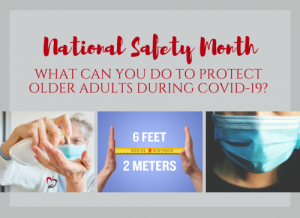
We have all heard how people in assisted living and nursing facilities have become sick with the COVID-19 pandemic, but what can we do to protect our older adults living in their homes or living in a family member’s home?
Older adults with underlying medical conditions like heart or lung disease or diabetes have been hit the hardest. According to the CDC that also includes people who are immunocompromised with conditions such as cancer treatment, prolonged use of certain medications, chronic kidney disease undergoing dialysis, liver disease and even severe obesity.
Whether you live with an older person, are a relative serving as a caregiver periodically, or provide care as a home care professional, your role as a knowledgeable safety supporter is critical. Older adults are often forgetful of basic steps to reduce their chances of getting sick. You can remind them of these steps to reduce their risk:
- Wash hands often. People say they wash their hands but often they do not know just how critical the length of time and frequency is important to avoid infection.
- Take everyday precautions to keep space between themselves and others that come to their home. That means staying 6 feet away which is about two arm lengths.
- Keep away from people who are sick. Explain to them that people do not always know they could be carrying coronavirus and could pass it on to them.
- Stock up on supplies. Ask them what they need every chance you get and if they can, encourage adding to a list that stays somewhere convenient for others in the household to see. Older adults typically think about how they can buy less on their fixed incomes, so you may need to help them plan ahead.
- Clean and disinfect frequently touched services. Help them think about the times that new people are in their home or new packages which have been brought in so that they plan for someone (or themselves) to clean table and countertops as well as door handles more often that they normally would.
Some older adults have to live in the same household with people of all ages, including children, who are going more places. Help everyone around your loved one to understand that anyone can get sick, but especially their grandpa, grandmother, or aunt. Six feet apart and even masks are not a bad idea if there is a lot of coming and going in the home.
All of this effort to be safe takes time and energy for everyone. Additionally, there may be people working at home, multiple duties with children or recently lost income. Keep in mind that you can control stress in many ways, and even though an older person in the home, may not have much to do to help, they still are impacted by more noise, more anger or sadness around them. Here are some activities to help anyone to reduce mental health issues:
- Try not to watch too much tv news or take in too much social media. Hearing about the pandemic repeatedly can be upsetting.
- Encourage healthy schedules…regular “lights out” at night, well-balanced meals, exercise at hours which might be an alternative to alcohol or drugs. Anyone can use spiritual time, meditation, and a brief series of deep breaths and stretches. Respect each other’s space to allow for “downtime”.
- Connect with others. Everyone in the household needs to stay connected by phone or sitting outdoors six feet apart with friends. Talking about good memories is always helpful, not only for older loved ones, but for everyone.
These are just a few ideas of how to help keep older adults living at home safe during these difficult times. For more information about everything from symptoms to when to call a medical professional, the CDC is an excellent resource. Visit https://www.cdc.gov/. We also welcome your calls anytime if you need more support!



